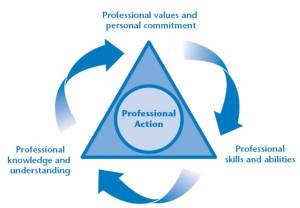If you have any of these questions regarding professional development, or if you have any of the answers, then we´d like to hear them.
How to develop professionally?
What follows are just a few tools you might want to use in order to help you develop professionally:
Teacher diaries
For more, go to:
http://www.teachingenglish.org.uk/transform/teachers/teacher-development-tools/teacher-diaries
´Critical friends´
For more, go to:
http://www.icvet.tafensw.edu.au/resources/critical_friends.htm
Team teaching
For more, go to:
http://iteslj.org/Techniques/Benoit-TeamTeaching.html
Teacher portfolios
For more, go to:
Mentoring
Mentoring is sometimes thought of as a new approach to development for language teachers, but in fact, mentoring has a long history. Mentoring is “an interpersonal, ongoing, situated, supportive, and informative professional relationship between two (or more) individuals, one of whom (the mentor) has more experience in the profession, craft, or skill in question.
For more, go to:
http://www.eslteachersboard.com/cgi-bin/articles/index.pl?read=3158


No questions or answers…this is just to say hi
Hi,
this is something for all those teachers in Maceio who are starting their ´action research´ projects.
There is a very reader friendly over-view of action research steps and procedures which may help you when you are deciding the research question you want to investigate, how to collect data and record the data, which you can find at:
Click to access conducting_action_research.pdf
Let us know if you need any other help.
Dom
Hi,
for all those in Ilha do Leite who are embarking on the ´Professional Development Portfolio´ project, go to:
http://www.jalt-publications.org/tlt/files/97/jan/portfolios.html
for a useful outline on the what? why? and how? of starting a portfolio.
Dom
Hi everyone,
I´ve started reading the report on conducting an action research on the site above, recommended by Dominic and I find it very useful in order to understand the process and techniques.
Thanks!!
Hi to all those in Maceio and Joao Pessoa.
These are some of the areas being covered in the Action research. It would be a good idea to get in contact with onae another and see if you can collaborate and share research findings, ideas and experiences, etc.
In Joao Pessoa…
Natasha+Érika – How to encourage my young learners students to use L2 in the classroom?
Get + Ribamar – How to deal with fossilised pronunciation mistakes?
Suzana – Indiscipline in young learners classes
Chris – How to effectively present grammar in class
Yluska – classroom management
Jane – Error correction
And in Maceio…
Aline – use of L1 in the classroom
Celeste – using warmers / which type of vocabulary activities help my SS to memorise lexis?
Kenia + Cris – giving instructions
Adriana – using pronunciation teaching to improve listening skills
Juliana – increasing SS interaction
Marcos – freer practice grammar activities
Lais – SS interaction
Judith – using the phonemic chart to help SS with pronunciation
Any others????
Dom
good to see that teachers in Maceio also enjoy phonetics and understand the importance of it…..hugs to you all in Maceio….Get (Gerthrudes) from Paraiba
One more group for the A.R in João Pessoa:
Manuela and Elizângela – Helping teenagers to write better compositions.
A.R topic from João Pessoa:
Jacilene and Jamylle – Action research on Writing: using short articles from newspapers & magazines to increase Sts’ motivation to write
Hi,
it seems that many of you are focussing on some aspect of student-student interaction for your action research project.
Here is an interesting link for an article describing an action research project on just this topic.
http://iteslj.org/Articles/Snell-Interaction.html
Hello from João Pessoa!
Does anyone have ideas of how you could present grammar and also employ student-student interaction?
How can we make Use of English more than a necessary evil? That is the question?
You might want to use a Guided Discovery, which is an inductive approach.
In a language classroom, an inductive approach involves getting learners to discover rules and how they are applied by looking at examples. The role of the teacher is to provide the language the learners need to discover the rules, to guide them in discovery if necessary, and then to provide more opportunities to practice.
The inductive approach is often thought of as more modern way of teaching: it involves discovery techniques; it seeks in some ways to duplicate the acquisition process; it often exploits authentic material; it has learners at the centre of the lesson; and the focus is on usage rather than rules.
Here is an example of a lesson using the inductive approach. The teacher’s aim in this lesson is that learners understand meaning, form and use of linking devices in formal writing.
1)The teacher gives the learners a text to read and respond to.
2)She then asks them to identify all the conjunctions in the text and then put them into 5 or 6 groups according to use, e.g. to add something, to make a contrast, to show a result.
3)The learners themselves suggest headings for these categories.
4)The teacher monitors and guides. Groups of learners then work with one category each to analyse structure, meaning and use, and finally present their findings to the class.
For a more detailed outline of inductive and deductive approaches, go to……
Click to access Decoo_In-deduc.pdf
Dom